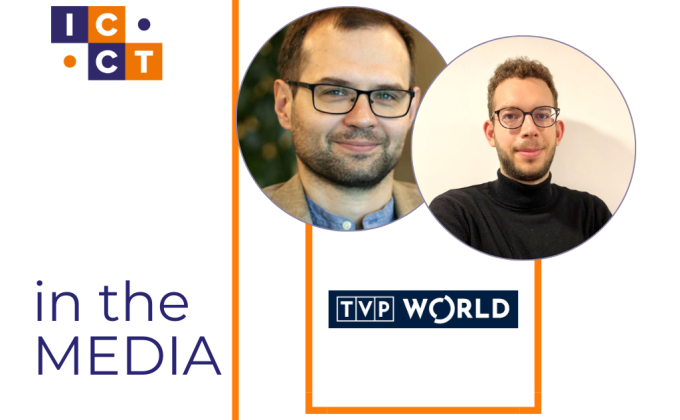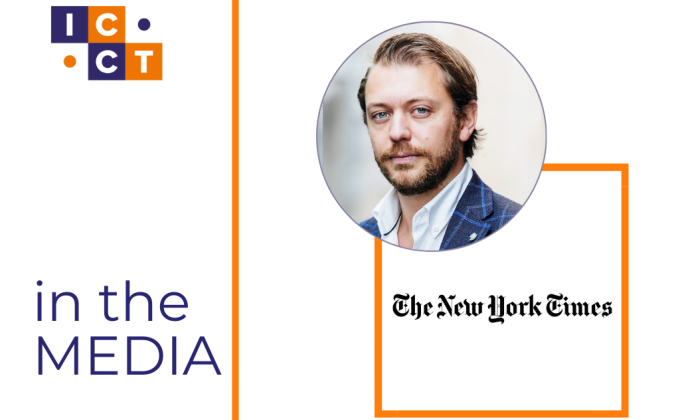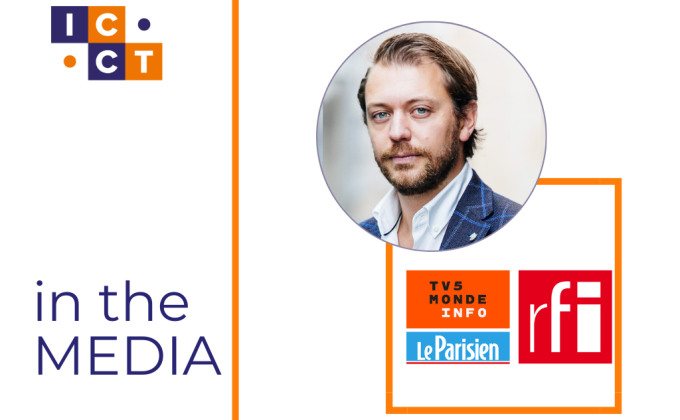Since June 2012, ICCT has been participating in the EU Commission’s Radicalisation Awareness Network (RAN). RAN, which officially launched on 9 September 2011, is an “umbrella network”, or network of networks, which provides a platform for practitioners to gather and share best practices in countering radicalisation leading to violent extremism. RAN is organised into eight thematic working groups, driven by a Steering Committee. ICCT Director Peter Knoope co-chaired the INT/EXT Working Group together with Dr. Magnus Ranstorp, Research Director at the Center for Asymmetric Threat Studies at the Swedish National Defence College. The purpose of this working group is to provide a cross-sector platform that brings government and non-government experts together to better understand and address the problem of “foreign fighters” in the context of preventing and countering violent extremism. The INT/EXT working group has held a number of meetings discussing the phenomenon of foreign fighters, including:
- "Foreign Fighters" (The Hague, 20-21 September 2012)
- "Constructing Counter-Narratives from Experience" (Berlin, 8 November 2012)
- "European Foreign Fighters in Syria" (Amsterdam, 21 April 2013)
- "Foreign Fighters: Working with Individuals, Families and Communities Before, During and After Travel" (Antwerp, 16-17 September 2013)
- "Cities Conference" on Foreign Fighters in Syria (The Hague, 30 January 2014)
- "Reintegrating Foreign Fighters with a Focus on Family Support Structures" (Berlin, 26-27 May 2014)
For more information on RAN, please visit the RAN website or contact ICCT Programme Officer Eva Entenmann. First Meeting on Foreign Fighters (The Hague, 20-21 September 2012) The first RANINT/EXT meeting took place in The Hague in September 2012. The meeting was dedicated to discussing foreign fighters, and how this phenomenon impacts the internal and external dimensions of the Union. Ultimately the first INT/EXT meeting sought to gather relevant, knowledgeable actors to understand the discourses surrounding the problem and to get a preliminary outline of the policy options and responses available. The meeting was attended by policymakers, frontline workers, practitioners and academics. As this was the WG's kick-off meeting a wide variety of topics were discussed. Discussions began at the international (macro) level as to what regional organisations such as the UN and EU made of the problem and what steps were underway (both now or in the future) to confront it. The meeting then also examined national perspectives at both policy level and through learning from the experiences of frontline practitioners. Take-aways from the meeting indicated that, at that point, many participants were new to the phenomenon and to specific strategies to deal with it. Discussions led to a collection of current (and potential) responses that could be further explored both inside and outside the Union. These ranged from "hard" measures such as increased surveillance or stronger laws to prevent those travelling or to prosecute those returning. "Softer" measures included increased support for affected communities, creating the space for dialogue between government and civil society and using more effective counter narratives specific to this issue. Second Meeting "Constructing Counter-Narratives from Experience" (Berlin, 8 November 2012) The second INT/EXT meeting again focussed on the issue of foreign fighters. It focussed specifically on conclusions raised in the first meeting on "softer" measures that could be cultivated and in particular on how to craft credible counter-narratives i.e. a credible message which directly responds to the persuasive stories attracting people to fight. This one day meeting was small and informal, gathering around 20 frontline practitioners including those working with former terrorists, some working specifically with women to counter violent extremism and practitioners working with families and youth. The meeting provided a series of concrete recommendations on forming counter-narratives specifically for foreign fighters. Recommendations were targeted at various levels, such as government and policy level, while also at frontline workers. Ideally, all actors would be singing from the same hymn sheet, so to speak, with a coherent consistent message across all levels. An interesting point was made about the 'original' narrative. In terms of, for instance, radical Islamic extremism, this is a recent narrative which has grown considerably since 9/11. The original narrative is one of peaceful, religious Islam, so therefore isn't the 'counter-narrative' a return to the original – or norm? If this were emphasised more heavily in all public communications, it would greatly help to change public opinion or the established narrative of the past decade. The findings of both the September and November meetings were reported back to policymakers both at the EU and Member States' levels during a High Level Conference on Countering Violent Extremism, organised by the Commission in January 2013. Third Meeting "European Foreign Fighters in Syria" (Amsterdam, 21 April 2013) By April 2013, the problem of foreign fighters travelling to Syria had climbed increasingly up the European policymaking agenda. The first preliminary report on numbers of those Europeans travelling to fight in Syria was released in March by the International Centre for the Study of Radicalisation (ICSR). With this in mind the WG wanted to specifically focus on the issue of Europeans travelling to Syria, to get a baseline assessment of those going and to undertake an inventory of policies or activities in place since the first meeting in September 2012. Policy makers attended this meeting primarily, along with several knowledgeable academics. ICSR firstly presented the results of their study and participants then reported on their experiences in their own home states. The discussion then turned towards motivations and drivers and issues such as recruitment mechanisms. The meeting succeeded in providing a fairly comprehensive assessment of the problem. It further resulted in several conclusions:
- Clear coordinated communication policies are a crucial aspect of deterrence. Such strategies should be aimed across all levels from the micro frontline works and local government to macro national governments and multilateral bodies. The message should be clear: travelling to Syria will not benefit the traveller or those in Syria. It should be clearly highlighted that the fight is not glamorous.
- To bolster this message, mechanisms could be set up to help those wanting to help in Syria. Online dialogues, with up to date news from people there, for instance, could be established. Online mechanisms to contribute to the humanitarian effort easily, and track progress of your participation.
- Governments should build on preventive structures that are currently in place and adjust these deal with the issue of foreign fighters. This could be a task of the different working groups of the Radicalisation Awareness Network.
- Governments should coordinate their strategies across all bodies involved to ensure coherency and efficiency.
- Greater information should be shared between governments on those that pose a risk and those who are returning. Greater cooperation at borders should also be implemented.
- European countries should engage with other countries from the region to exchange knowledge and experience and to identify areas for possible collaboration.
Fourth Meeting "Foreign Fighters: Working with Individuals, Families and Communities Before, During and After Travel" (Antwerp, 16-17 September 2013) The fourth RAN INT/EXT meeting focussed on the work of practitioners in relation to European foreign fighters. It gathered approximately 40 frontline workers from across Europe who discussed their experiences and activities in place to confront the issue. The meeting highlighted the various activities being undertaken both at community level and also by, for instance, local municipalities. Based on the discussions at this meeting and drawing on information from the previous three gatherings, a Declaration of Good Practices for Engagement with Foreign Fighters for Prevention, Outreach, Rehabilitation and Reintegration was drafted. This list of RAN good practices is a living document and is not intended to be exhaustive. However it provides an overview of concrete, practical activities that can be undertaken specifically in relation to foreign fighters. "Cities Conference" on Foreign Fighters in Syria (The Hague, 30 January 2014) On 30 January, RAN organised the so-called "Cities Conference" in The Hague, which brought together over 170 practitioners and experts from 23 European cities to discuss foreign fighter travel to Syria. The conference provided participants with the opportunity to exchange views, insights and best practices from various European cities to best tackle radicalisation and increasing foreign fighter travel. As co-chair of RAN's INT/EXT Working Group, ICCT Director Peter Knoope participated as a speaker in the event. Key conclusions of the conference included:
- Involment and training of front-line practitioners such as police officers and youth workers is crucial
- Families and communities should not be perceived as hotspots of radicalisation, but as partners to prevent people from travelling to Syria
More information about the Cities Conference is available here (in Dutch) and a full meeting report is available on the RAN website. Fifth Meeting "Reintegrating Foreign Fighters with a Focus on Family Support Structures" (Berlin, 26-27 May 2014) On 26 and 27 May, 25 practitioners came together for the RAN INT-EXT conference on reintegrating foreign fighters by providing family support. The aim of the meeting was to create a workable model of foreign fighter reintegration which includes first steps and reaching out to families, defining who should be involved and methods of involvement. Families are often key actors in prevention (of travel to foreign conflicts), can act as agents of change to convince their relatives to return home and can provide enormous support structures for those who have returned. It was recognised that family members can also be spoilers in de-radicalisation, reintegration and safeguarding processes, however their importance should not be overlooked. The majority of the participants in the meeting were in direct contact with families of foreign fighters. The focus of the meeting was on foreign fighters in Syria and practitioners presented six case studies which included examples of: • A fighter who had travelled, returned and died in Syria • A returnee with no social network or family support • A young (minor) potential fighter who was heavily radicalised but stopped at the Belgian border • De-radicalisation in a multi-agency setting • Safeguarding other family members at risk • German experiences and the Hayat programme Further information



